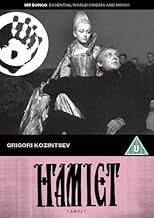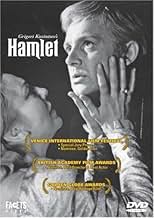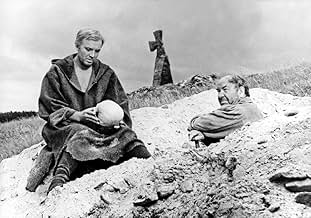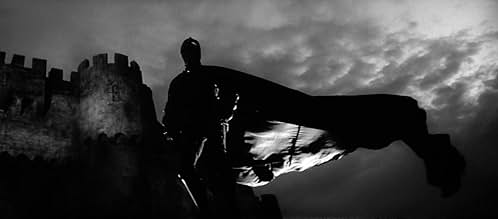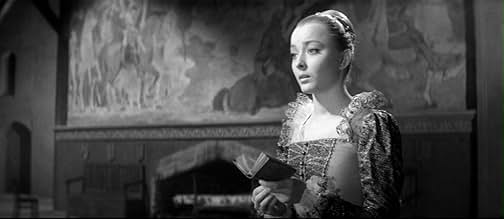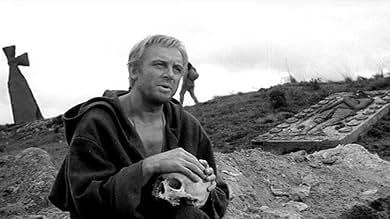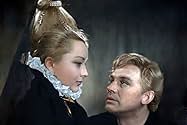IMDb RATING
8.2/10
3.2K
YOUR RATING
After the death of the King of Denmark - Hamlet's father - his brother Claudius ascends the throne, who takes his widow Gertrude as his wife. Hamlet meets the ghost of his father and learns ... Read allAfter the death of the King of Denmark - Hamlet's father - his brother Claudius ascends the throne, who takes his widow Gertrude as his wife. Hamlet meets the ghost of his father and learns that he was killed by Claudius.After the death of the King of Denmark - Hamlet's father - his brother Claudius ascends the throne, who takes his widow Gertrude as his wife. Hamlet meets the ghost of his father and learns that he was killed by Claudius.
- Director
- Writers
- Stars
- Nominated for 2 BAFTA Awards
- 5 wins & 6 nominations total
Innokentiy Smoktunovskiy
- Hamlet
- (as I. Smoktunovskiy)
Mikhail Nazvanov
- Claudius korol
- (as M. Nazvanov)
Elza Radzina
- Gertrude koroleva
- (as E. Radzin)
Yuriy Tolubeev
- Polonius
- (as Yu. Tolubeyev)
Anastasiya Vertinskaya
- Ophelia
- (as A. Vertinskaya)
Vladimir Erenberg
- Horatio
- (as V. Erenberg)
Stepan Oleksenko
- Laertes
- (as S. Oleksenko)
Vadim Medvedev
- Guildenstern
- (as V. Medvedev)
Igor Dmitriev
- Rosencrantz
- (as I. Dmitriyev)
Aadu Krevald
- Fortinbras
- (as A. Krevald)
Viktor Kolpakov
- Mogilshchik
- (as V. Kolpakov)
Aleksandr Chekayevskiy
- Perviy akter
- (as A. Chekayevsky)
Rein Aren
- Lucianus- vtoroy akter
- (as R. Aren)
Yuriy Berkun
- Tretiy akter
- (as Yu. Berkun)
Ants Lauter
- Svyashchennik
- (as A. Lauter)
- Director
- Writers
- All cast & crew
- Production, box office & more at IMDbPro
8.23.1K
1
2
3
4
5
6
7
8
9
10
Featured reviews
Nothing rotten here
Cinematographically, this looks fantastic. That might be the most immediately striking thing about this grand Soviet adaptation of Shakespeare's play. The wide sweeping shots the castle, this cliffs, and and the story sea at this Estonian Elsinore as they are swarmed by medieval courtesans and armies is incredibly impressive. The scenes with the ghost of Old Hamlet may be some of the most simultaneously grand and spooky I have seen.
Though in some senses (such as costuming) a traditional Hamlet, this film, perhaps somewhat by virtue of being an adaptation in translation, has a outsider viewpoint that allows to to take liberties with sequence and setting while maintain a feeling of fealty. And this lends itself to the broad-scoped cinematic feel. We first see Hamlet upon his return to Denamrk, we follow him on the ship and on the way back. What changes there are only help suit the material to them medium of film.
Innokentiy Smoktunovskiy is a very good Hamlet and worth of the role. His baseline is quiet and solemn glumness (even for a Hamlet), which makes it the more impressive and disturbing when in his passion or "madness" he is furious or energetic and glib. He is complimented by a great Claudius and a fascinating performance by Anastasiya Vertinskaya as Ophelia, who makes scenes almost difficult to watch with how earnestly she plays having been driven mad.
The film is blessed to have music by the great composer Dmitri Shostakovich, who demonstrates a subtle and masterful hand with film scoring by writing music that doe snot intrude on the film but greatly enhances that mood and really seems to fit the windswept crags of the setting. The translation is by Boris Pasternak, who from while I can incompletely understand seems to eschew completely literalness for a more terse poetry of his own -- a debatable choice but perhaps best for the purposes of film.
In all certainly a huge achievement that can stand among the best of the many screen versions of Hamlet.
Though in some senses (such as costuming) a traditional Hamlet, this film, perhaps somewhat by virtue of being an adaptation in translation, has a outsider viewpoint that allows to to take liberties with sequence and setting while maintain a feeling of fealty. And this lends itself to the broad-scoped cinematic feel. We first see Hamlet upon his return to Denamrk, we follow him on the ship and on the way back. What changes there are only help suit the material to them medium of film.
Innokentiy Smoktunovskiy is a very good Hamlet and worth of the role. His baseline is quiet and solemn glumness (even for a Hamlet), which makes it the more impressive and disturbing when in his passion or "madness" he is furious or energetic and glib. He is complimented by a great Claudius and a fascinating performance by Anastasiya Vertinskaya as Ophelia, who makes scenes almost difficult to watch with how earnestly she plays having been driven mad.
The film is blessed to have music by the great composer Dmitri Shostakovich, who demonstrates a subtle and masterful hand with film scoring by writing music that doe snot intrude on the film but greatly enhances that mood and really seems to fit the windswept crags of the setting. The translation is by Boris Pasternak, who from while I can incompletely understand seems to eschew completely literalness for a more terse poetry of his own -- a debatable choice but perhaps best for the purposes of film.
In all certainly a huge achievement that can stand among the best of the many screen versions of Hamlet.
Finest Shakespeare ever filmed
Utterly brilliant - I saw this film 17 times in the cinema when it first came out in 1964 - and I was all of 18. I'd never read Hamlet, never heard of Shostakovitch, couldn't speak a word of Russian - and yet this film changed my life! Now it's finally arrived on DVD in all its original splendour, complete with Shostakovitch's sensational score in stereo... The editing of Shakespeare's original by Pasternak is masterly, the direction faultless - but it's Innokenty Smoktunovsky's interpretation of Hamelt that lingers a lifetime in the mind. I've seen every other film adaptation of Hamlet, and none of them come anywhere close to this incredible cinematic masterpiece, which remains my #1 film of all time!
A great film now on DVD
I share the previous reviewer's high estimation of this wonderful film. It is a highly political and imaginative interpretation of Hamlet, making Hamlet a man of action who is nevertheless alienated at court. The opening sequence is a stunning interpretation of Hamlet's view that the time is out of joint--Hamlet rushes back to court on horseback even as the flags of mourning are being unfurled. Claudius's speech is delivered by a herald and then translated by ambassadors. When we get to Claudius giving the rest of it to his court, it's not clear how much time, if any, has passed. nor is it clear who is in command (who is giving the orders that the flags be unfurled, cannons fired, the proclamation read, and so on). When Claudius finally addresses Hamlet aft the camera tracks him moving right down the table of courtiers, Hamlet's chair is empty. the opening sequence also moves from open external spaces ( a shot of the sea, a long shot of the land, and moves to increasingly shut in , interior spaces (the castle gates drop as the music gets ominous) to suggest that Denmark is indeed a prison. Visually and musically the film is very rich. I would rank this as the best of the filmed Hamlets.
10dmeltz
A Treat for the Eyes and the Ears
I have to marvel at the production values in this wonderful film. Exquisite sets, lighting and costumes. Stunning location. Epic original music score by Dmitri Shostokovitsch -- the music alone is more than enough to recommend this film. Great acting by, among others, Innokenti Smoktunovsky as Hamlet. Every scene an artistically complete poem of light and sound. Oh, and if you wonder what it's like to hear Shakespeare in Russian . . . it's great! The translation is by Boris Pasternak, one of the finest poets in any language. An epic treatment of the epic story.
A revelation...
Wow! What a film! I saw it recently with three friends at Chicago's Facets Cinematheque, and we were collectively stunned by this film. On at least three occasions, it took my breath away--the ghost on the ramparts sequence, the play within the play sequence, and Ophelia's mad sequence were just incredibly wrought. I can't say enough about this film.
Did you know
- TriviaConsidered by John Gielgud and Kenneth Branagh to be the definitive screen adaptation of the play according to a New York Times profile of lead actor Smoktunovsky.
- GoofsDuring the first round of fencing between Hamlet and Laertes, there is a brief shot in which they are suddenly missing their vests. This occurs two minutes before the shot where they both remove their vests, in preparation for the second round.
- ConnectionsFeatured in Kino (1971)
- How long is Hamlet?Powered by Alexa
Details
- Runtime
- 2h 20m(140 min)
- Color
- Sound mix
- Aspect ratio
- 2.35 : 1
Contribute to this page
Suggest an edit or add missing content

